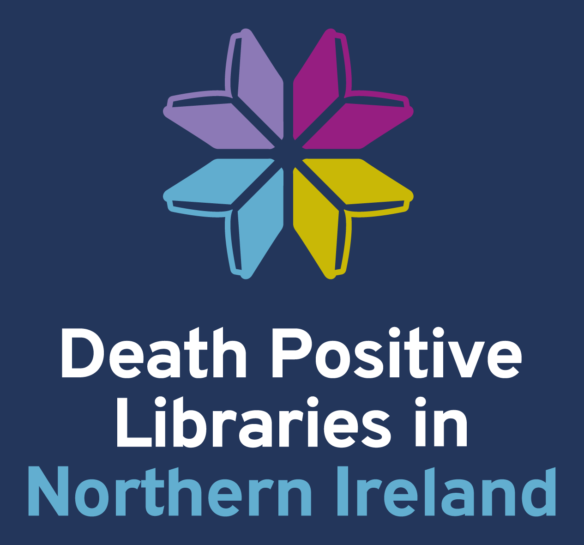
Death Positive Libraries in Northern Ireland

What is it?
Death Positive Libraries in Northern Ireland (DPLNI) is an initiative that aims to improve the health and death literacy of communities by providing access to information and events that remove the barriers that people experience to talking about death and dying.
In partnership with Libraries NI we seek to fill a gap in public access to books and literary resources that cover a range of topics about death, dying and bereavement. Books offer readers practical information on planning for end of life, guidance on how to have tender conversations about death and dying, and provides people with an opportunity to develop a greater understanding of living through the realities of a health crisis.

Where are they?
Death Positive Libraries in Northern Ireland are located in:
Derry Central Library
Omagh Library
Newry City Library
Northern Regional College (Ballymena and Newtownabbey Campuses)
Death Positive Library books can be requested at different library locations in Northern Ireland.


The Invisible Communities
Living with Dying
People faced with a life-limiting diagnosis that is likely to shorten their life often experience a ‘social death’ long before their physical death. As health declines people realistically have to reduce hours and tasks at work until the time comes that they have to give up work altogether.
This loss of purpose, identity and social network diminishes a person’s access to social support. The same loss may also be evident as people can no longer access leisure activities, faith groups and other important communities.
Living as a Carer
Long-term caregiving is a privilege, but it is not without challenges. Social isolation and loneliness are a reality; some people may have to stop working, feel unable to leave the house, or experience guilt because they feel overwhelmed.
Living with bereavement
A bereaved person can experience multiple losses after the death of their loved one; the loss of companionship, loss of connection, loss of friends they shared, loss of purpose if they were the caregiver, loss of identity…. Feelings of loneliness and social isolation is keenly felt when support is most needed.
Reach Out
Family, friends, neighbours, work colleagues, parishioners, coaches, team comrades, have an important role; when the time comes that their friend can no longer reach them, they can reach out.
Small acts of kindness offer compassionate care, keeping a person involved in their community through storytelling, news and updates helps them still feel involved. Practical support such shopping, gardening or cooking help to lighten the burden.
It is important to gently keep offering support even when it is initially refused. Find ways to make it easier to accept offers of help, ‘I was passing so I thought I’d pop in’, ‘I made too much lasagne so you’d be doing me a favour if you took some’, ‘It was buy one, get two!
Social support is priceless and yet costs nothing but time.

